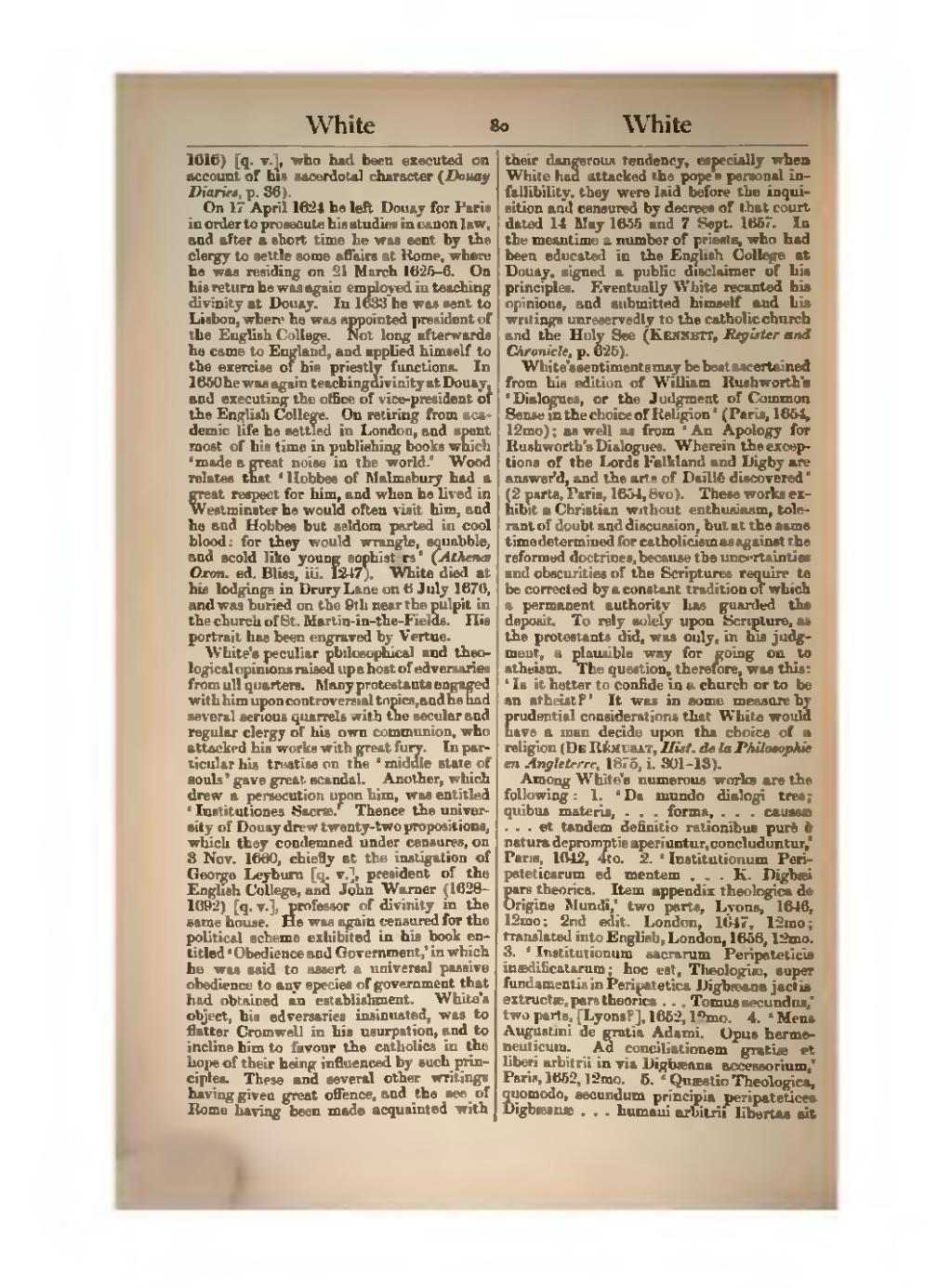1616) [q. v.], who had been executed on account of his sacerdotal character (Douay Diaries, p. 36).
On 17 April 1624 he left Douay for Paris in order to prosecute his studies in canon law, and after a short time he was sent by the clergy to settle some affairs at Rome, where he was residing on 21 March 1625–6. On his return he was again employed in teaching divinity at Douay. In 1633 he was sent to Lisbon, where he was appointed president of the English College. Not long afterwards he came to England, and applied himself to the exercise of his priestly functions. In 1650 he was again teaching divinity at Douay, and executing the office of vice-president of the English College. On retiring from academic life he settled in London, and spent most of his time in publishing books which ‘made a great noise in the world.’ Wood relates that ‘Hobbes of Malmsbury had a great respect for him, and when he lived in Westminster he would often visit him, and he and Hobbes but seldom parted in cool blood: for they would wrangle, squabble, and scold like young sophisters’ (Athenæ Oxon. ed. Bliss, iii. 1247). White died at his lodgings in Drury Lane on 6 July 1676, and was buried on the 9th near the pulpit in the church of St. Martin-in-the-Fields. His portrait has been engraved by Vertue.
White's peculiar philosophical and theological opinions raised up a host of adversaries from all quarters. Many protestants engaged with him upon controversial topics, and he had several serious quarrels with the secular and regular clergy of his own communion, who attacked his works with great fury. In particular his treatise on the ‘middle state of souls’ gave great scandal. Another, which drew a persecution upon him, was entitled ‘Institutiones Sacræ.’ Thence the university of Douay drew twenty-two propositions, which they condemned under censures, on 3 Nov. 1660, chiefly at the instigation of George Leyburn [q. v.], president of the English College, and John Warner (1628–1692) [q. v.], professor of divinity in the same house. He was again censured for the political scheme exhibited in his book entitled ‘Obedience and Government,’ in which he was said to assert a universal passive obedience to any species of government that had obtained an establishment. White's object, his adversaries insinuated, was to flatter Cromwell in his usurpation, and to incline him to favour the catholics in the hope of their being influenced by such principles. These and several other writings having given great offence, and the see of Rome having been made acquainted with their dangerous tendency, especially when White had attacked the pope's personal infallibility, they were laid before the inquisition and censured by decrees of that court dated 14 May 1655 and 7 Sept. 1657. In the meantime a number of priests, who had been educated in the English College at Douay, signed a public disclaimer of his principles. Eventually White recanted his opinions, and submitted himself and his writings unreservedly to the catholic church and the Holy See (Kennett, Register and Chronicle, p. 625).
White's sentiments may be best ascertained from his edition of William Rushworth's ‘Dialogues, or the Judgment of Common Sense in the choice of Religion’ (Paris, 1654, 12mo); as well as from ‘An Apology for Rushworth's Dialogues. Wherein the exceptions of the Lords Falkland and Digby are answer'd, and the arts of Daillé discovered’ (2 parts, Paris, 1654, 8vo). These works exhibit a Christian without enthusiasm, tolerant of doubt and discussion, but at the same time determined for catholicism as against the reformed doctrines, because the uncertainties and obscurities of the Scriptures require to be corrected by a constant tradition of which a permanent authority has guarded the deposit. To rely solely upon Scripture, as the protestants did, was only, in his judgment, a plausible way for going on to atheism. The question, therefore, was this: ‘Is it better to confide in a church or to be an atheist?’ It was in some measure by prudential considerations that White would have a man decide upon the choice of a religion (De Rémusat, Hist. de la Philosophie en Angleterre, 1875, i. 301–13).
Among White's numerous works are the following:
- ‘De mundo dialogi tres; quibus materia, … forma, … caussæ … et tandem definitio rationibus purè è natura depromptis aperiuntur, concluduntur,’ Paris, 1642, 4to.
- ‘Institutionum Peripateticarum ad mentem … K. Digbæi pars theorica. Item appendix theologica de Origine Mundi,’ two parts, Lyons, 1646, 12mo; 2nd edit. London, 1647, 12mo; translated into English, London, 1656, 12mo.
- ‘Institutionum sacrarum Peripateticis inædificatarum; hoc est, Theologiæ, super fundamentis in Peripatetica Digbæana jactis, extructæ, pars theorica … Tomus secundus,’ two parts, [Lyons?], 1652, 12mo.
- ‘Mens Augustini de gratia Adami. Opus hermeneuticum. Ad conciliationem gratiæ et liberi arbitrii in via Digbæana accessorium,’ Paris, 1652, 12mo.
- ‘Quæstio Theologica, quomodo, secundum principia peripatetices Digbæanæ … humani arbitrii libertas sit
